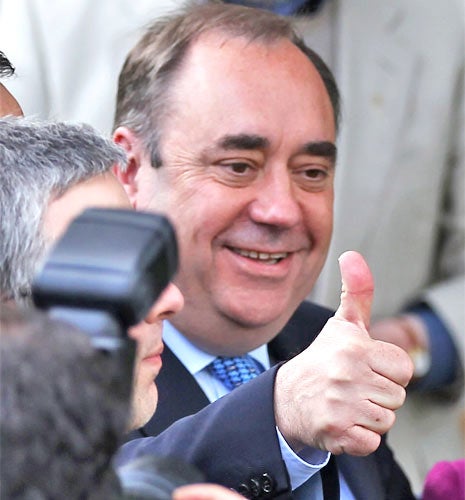SNP landslide puts break-up of Britain on political agenda

A triumphant Alex Salmond swept back to power in Scotland in such emphatic style that he put the break-up of Britain firmly on the political agenda for the first time in 300 years.
The Scottish First Minister led the Scottish Nationalists to the best result in their history, securing 69 of the Scottish Parliament's 129 seats – the first majority for any party since devolution in 1999.
Claiming his party's victory as "historic", Mr Salmond immediately declared his intention to bring forward a referendum on Scottish independence. His new majority at Holyrood gives him the votes to get a referendum Bill through the Scottish Parliament, meaning Scots will be asked if they want to secede from the United Kingdom at some time in the next five years.
The Nationalist success came at the expense of both Labour and the Liberal Democrats. The Labour Party, which has treated Scotland as its most trustworthy fiefdom for much of the past century, suffered its worst result north of the border for more than 80 years as the SNP took seat after seat in the Labour heartlands of Glasgow, Edinburgh, Lanarkshire and Renfrewshire.
But the SNP victory was fuelled mainly by the extraordinary collapse of the Liberal Democrat vote. The Liberal Democrats went into the election with 16 seats at Holyrood. They finished with only five and without a single constituency MSP on the mainland of Scotland.
The Tories, already down to their core supporters, saw their share of the vote dip but held their ground in the face of the SNP surge, starting with 17 seats and ending up with 15. In many areas, the Labour vote held up well, but with Liberal Democrat supporters switching to the SNP, Labour was swept aside.
The result was devastating for both the Scottish Labour leader Iain Gray, who immediately announced he would resign in the autumn, and Tavish Scott, the Scottish Liberal Democrat leader.
Mr Salmond declared: "Before the SNP was formed, one of our forebears was the National Party of Scotland. I think, 70 or more years later, the SNP can finally claim we have lived up to that accolade as the national party of Scotland."
Mr Salmond claimed the SNP had restored the trust of Scottish people in a way no party had ever done in Scotland. "We must trust the people," he said. "That is why in this term of parliament, we will bring forward a referendum and trust the people with Scotland's own constitutional future."
David Cameron congratulated Mr Salmond on his victory but stressed he would campaign hard against Scottish independence: "I will campaign to keep the United Kingdom together with every fibre that I have."
Mr Gray, who led Labour to its worst Scottish electoral performance in living memory, announced he would step down. "The Labour Party was very much second best," he said. "We could have done better. I do accept responsibility."
With only 37 MSPs in the Scottish Parliament – down from 46 in the last parliament – Labour needs someone to turn the party around. Many of the potential candidates who might have stepped up to replace Mr Gray have now lost their seats to the SNP.
A similar rebuilding job awaits the Scottish Liberal Democrats who were punished by Scottish voters for their role in the Government at Westminster.
The Nationalists ran a clever campaign focused largely on the personality and stature of Mr Salmond. Now he has a majority, Mr Salmond will be able to drive through a host of policies he was prevented from implementing in the last session, including minimum pricing for alcohol and his flagship plan to offer Scots the chance to leave the UK.
Timetable For Independence
*The SNP has already published a draft Bill for an independence referendum. Now Alex Salmond has the votes required to pass it in the Scottish Parliament. He will republish the draft Bill in the next year or so, and spend three years raising the profile of the issue. After the Bill passes, there will be a referendum. If Scots vote in favour, the Scottish Government would then open negotiations with the UK Government. It is unlikely that any UK government would stand in the way.
Join our commenting forum
Join thought-provoking conversations, follow other Independent readers and see their replies
Comments